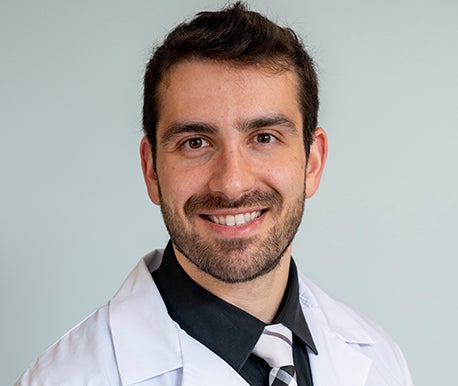News & Highlights
Topics: Clinical & Translational Research, Clinical Trials, Education & Training, Five Questions
Five Questions with Hanny Al-Samkari
A classical hematologist discusses how our training programs have impacted his career.

Hanny Al-Samkari, MD, is a classical hematologist and clinical investigator at Massachusetts General Hospital (MGH), where he is co-director of the Hereditary Hemorrhagic Telangiectasia Center of Excellence. He is an assistant professor of medicine at Harvard Medical School and a 2021 graduate of our Clinical and Translational (C/T) Research Academy, an advanced program that provides the core knowledge necessary to achieve C/T research independence. He also completed our two-year KL2/Catalyst Medical Research Investigator Training (CMeRIT) program.
After your residency, you came here in 2015 to do a hematology/medical oncology fellowship at Dana-Farber/Mass General Brigham. How did the C/T Research Academy help you as a physician transition to immersion in research?
The classical path for physicians to become investigators has been an apprenticeship model. Hands-on experience is invaluable, but in 2021, you also need a structured, formal program covering all aspects of clinical and translational research to maximize your chances of a successful research career. This is where the C/T Research Academy excels. The academy included presentations on everything from best practices to write grants, work with industry, and advanced seminars in scholarly scientific writing and publishing.
The course directors for both the C/T Research Academy and the KL2/CMeRIT program are spectacular, and they’re always available. They make themselves available to us for whatever advice or resources we need.
There were other courses we could take, such as applied biostatistics, which is worth its weight in gold. If you’re doing clinical research and don’t know statistics, you are lost. What we learn on some of these critical topics in medical school or residency doesn’t even scratch the surface. The ability to understand complex statistics and perform simple to moderate statistics is invaluable for any c/t investigator.
Talk a bit about the research project and findings you presented on Harvard Catalyst’s Research Day last year?
“Hands-on experience is invaluable, but in 2021, you also need a structured, formal program covering all aspects of clinical and translational research to maximize your chances of a successful research career. This is where the C/T Research Academy excels.”
As a fellow, I began working on clinical trials and observational epidemiologic research in hematology in my mentor’s laboratory at MGH, David Kuter, MD, DPhil. I have had the opportunity to perform, complete, and publish multiple research projects and clinical trials since then in various aspects of hemostasis and thrombosis as well as red cell disorders. The project I presented at the Harvard Catalyst research day this year was an observational study of the anti-angiogenic therapy pazopanib in patients with hereditary hemorrhagic telangiectasia (HHT). This is a disease of abnormal blood vessel growth, which leads to fragile blood vessels that break and bleed.
The study demonstrated the striking effectiveness of low-dose oral pazopanib to considerably reduce bleeding and improve anemia in these patients. This study represents the potential for repurposing therapies with a strong mechanistic and scientific rationale. This drug, along with others I study, were developed to treat cancers—the other side of hematology/oncology—and we are successfully applying them in a non-cancerous bleeding disorder. This and other observational work has paved the way for additional prospective clinical trials moving forward.
What drew you to the hematology side of hematology-oncology and to being a clinical investigator?
I knew I was more interested in the hematology side of things when I entered my fellowship, but then it was through interactions with the expert classical hematologists I met at MGH and Dana Farber that clinched it for me. In particular, Dr. David Kuter, who was both my clinical and research mentor, inspired and fostered my love for classical hematology as a fellow.
There are so many diseases in my field for which there are no FDA-approved treatments. And some of these diseases aren’t all that rare. HHT is the second most common hereditary bleeding disorder in both the United States and the world. It’s twice as common as hemophilia. But there are no FDA-approved treatments for HHT, so the lifeline for these patients is our clinical trials. The same is true for many common and rare red blood cell disorders, like thalassemia and red cell enzymopathies. Working to develop therapies for diseases lacking them is extremely fulfilling because I see how, for the first time, these novel therapies change the lives of my patients for the better.
Most of our patients receiving medical care for their HHT are receiving medical care in a clinical trial. We’re developing one of the largest clinical trials programs in HHT in the world. Without the ability to do clinical investigation, I would not be able to provide our patients with as high a level of care or as many treatment options.
I think clinical practice and clinical investigation synergize very well. The trials advance science, and the treatments are then made available to patients.
“Without the ability to do clinical investigation, I would not be able to provide our patients with as high a level of care or as many treatment options.”
What do you ultimately want to accomplish?
I want to revolutionize the care of patients with bleeding disorders and hereditary hemolytic anemias. These hematologic disorders have by and large been neglected, and patients left out. As the co-director of the HHT center, I would like to see medicines get approved, and ultimately, develop an armamentarium of therapeutics that are effective and safe for these patients.
What do you do to relax outside of work?
When I’m not doing research and seeing patients, I try to catch college football games. I grew up in Ohio and am a huge Ohio State Buckeye fan and just generally root for the Big Ten. I’m also into board games and love a good board game night. Betrayal at the House on the Hill and Catan are two of my favorites!

